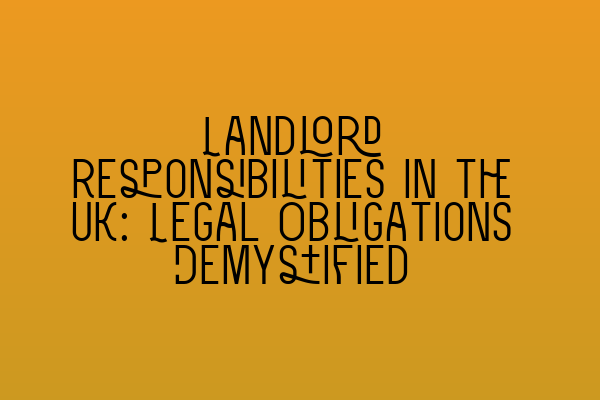## Landlord Responsibilities in the UK: Legal Obligations Demystified
Being a landlord in the UK comes with a wide range of responsibilities and legal obligations. It is crucial for every landlord to have a comprehensive understanding of these obligations to ensure compliance with the law and maintain a successful landlord-tenant relationship.
In this blog post, we will demystify the landlord responsibilities in the UK, providing you with the essential knowledge to navigate the complex landscape of property law. Whether you are a seasoned landlord or someone considering entering the property rental market, this article will serve as a valuable guide.
### Providing a Safe and Habitabme Property
One of the primary responsibilities of a landlord is to provide a safe and habitable property for tenants. This means ensuring that the property is structurally sound, free from hazards, and equipped with essential amenities. As a landlord, you have an obligation to maintain the property in proper working order, including electrical, gas, heating, water, and sanitation systems.
Moreover, it is crucial to comply with local health and safety regulations, such as providing working smoke detectors and carbon monoxide alarms. Regular inspections and maintenance checks are vital to identify and address any potential issues promptly.
### Tenancy Agreements and Rent Collection
Another essential aspect of being a landlord is creating and executing tenancy agreements. A tenancy agreement outlines the terms and conditions of the tenancy, including the duration, rent amount, and any additional responsibilities or restrictions. It is essential to have a clear and legally binding tenancy agreement to protect both parties involved.
Collecting rent on time is another integral part of the landlord’s responsibilities. It is crucial to set clear expectations regarding rent payments and penalties for late payments in the tenancy agreement. Consistent and proactive communication with tenants regarding rent collection can help maintain a healthy landlord-tenant relationship.
### Deposit Protection and Tenancy Deposit Schemes
As a landlord, you are legally required to protect your tenants’ deposits through a government-approved tenancy deposit scheme. This scheme ensures that tenants’ deposits are safeguarded and provides an independent adjudication service to resolve any deposit-related disputes.
Failing to protect the tenant’s deposit or provide them with the necessary documentation can result in severe consequences, such as financial penalties and restrictions on eviction proceedings. Therefore, it is crucial to familiarize yourself with the specific requirements of the tenancy deposit scheme in your jurisdiction and comply with them diligently.
### Repairs and Maintenance
Maintenance and repairs are an inherent part of the landlord’s responsibilities. It is essential to address any issues promptly to ensure the property remains in good condition. Regular inspections can help identify maintenance needs and prevent minor problems from escalating into more significant, costly issues.
Additionally, tenants have the right to request repairs, and it is the landlord’s obligation to respond and carry out the necessary repairs within a reasonable timeframe. Failing to address repair requests can lead to legal disputes and potential financial penalties. Therefore, it is advisable to maintain open lines of communication with your tenants and have a system in place to address repair requests in a timely manner.
### Adhere to Discrimination Laws
Landlords in the UK have a legal obligation to adhere to discrimination laws outlined in the Equality Act 2010. It is illegal to discriminate against tenants based on their race, gender, religion, disability, or other protected characteristics. When advertising a property, it is important to avoid using discriminatory language or expressing any preferences that may be seen as discriminatory.
During the tenant selection process, it is crucial to evaluate applicants based on their eligibility, such as creditworthiness and rental history, rather than their protected characteristics. Being knowledgeable about discrimination laws and ensuring fair treatment of all applicants and tenants is vital to avoiding legal issues and maintaining a positive reputation as a landlord.
### Conclusion
Being a landlord in the UK comes with a range of legal obligations and responsibilities. From providing a safe and habitable property to ensuring compliance with discrimination laws, landlords must be well-versed in property law.
By understanding and fulfilling these responsibilities, landlords can build strong relationships with tenants, prevent legal disputes, and maintain their property investments effectively. If you require further assistance or advice on landlord responsibilities, do not hesitate to consult with a professional property law solicitor at SQE Property Law & Land Law.
Related Articles:
– [SQE 1 Practice Exam Questions](https://fqps.co.uk/sqe/sqe1-preparation/mcq-practice-quiz)
– [SQE 1 Practice Mocks FLK1 FLK2](https://fqps.co.uk/sqe/sqe1-preparation/practice-mocks-quiz)
– [SQE 2 Preparation Courses](https://fqps.co.uk/sqe/sqe2-preparation)
– [SQE 1 Preparation Courses](https://fqps.co.uk/sqe/sqe1-preparation)
– [SRA SQE Exam Dates](https://fqps.co.uk/sqe/sqe1-sqe2-exam-dates)
